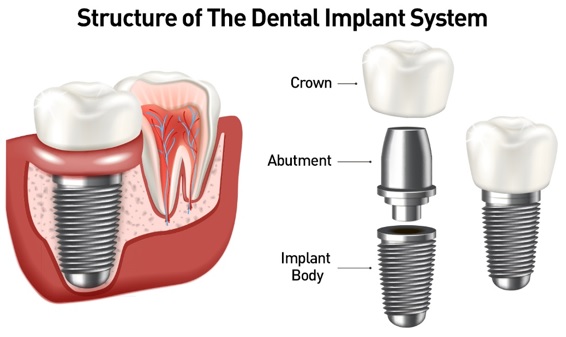
A radiant smile can transform your entire appearance and boost your self-confidence, and for those who have chosen dental implants as a solution to restore their smiles, maintaining impeccable oral hygiene is of utmost importance.
If you just had dental implants installed, you are sure to be looking to take good care of it as if it was a newborn. Maintaining your dental implants is crucial to ensuring their longevity and keeping your mouth healthy. One key component in achieving a healthy and dazzling smile with the implants is choosing the right mouthwash. But with countless options available in the market, how can you be sure you’ve found the best mouthwash for your dental implants?
In the rest of this article, we will explore the world of mouthwashes designed specifically for dental implant care, and provide you with essential tips in caring for those precious implants.
Understanding Dental implants
Dental implants are a type of prosthetic tooth root that is used to support a replacement tooth or bridge. Usually made with titanium, they are surgically implanted into the jawbone and are used to support dental prosthesis such as a crown, a dental bridge, or a denture.
Dental implants offer several benefits over other tooth replacement options such as bridges and dentures. Because they are anchored in the jawbone, dental implants are very stable and do not move around like dentures can. This makes them. a more comfortable option than other solutions as they are permanently fixed to your gums. They also do not require support from adjacent teeth, as bridges do. In addition, dental implants look and feel more like natural teeth, and they can be cared for in the same way as natural teeth.

The process of placing dental implants involves several steps and can last anywhere from 6 months to a year. Firstly, an assessment is done by your local dentist to determine whether your health and gum conditions are suitable for dental implants. In some scenarios, grafting may be done on the implant site to ensure that there is sufficient support for the implant.
During the surgery, the tooth implant, which is a small titanium post, is surgically placed into the bone socket. The implant site is allowed to heal for several months until it is bonded to the jawbone. A small connected — known as a abutment — is secured to the implant so that a replacement tooth or crown can be fixed onto it.
Based on your bite as well as the shape and color of your remaining tooth, a new tooth or crown of similar size and shade is manufactured. It is then attached to the abutment, giving you a new tooth that feel and functions exactly like your own natural teeth.
Dental implants are a very effective way to replace missing teeth and can help restore the function and appearance of the mouth. They are generally considered to be a long-term solution to tooth loss, and with proper care, they can last for many years. However, dental implants are cost-prohibitive and require a long recovery period when the implants are first placed.
Maintaining Dental Implants with Mouthwashes
Mouthwash are great in helping you maintain your oral health as they help to wash away any food particles while killing off bad bacteria in the mouth. When left to grow, these bacteria can lead to an array of gum diseases including gingivitis and periodontitis. Mouthwash also work to freshen your breath and reduce sensitivity, all while protecting your tooth enamel and whitening your teeth through active ingredients such as fluoride and hydrogen peroxide.
If the dental implants are not properly cared for, it may lead to peri-implantitis, a condition where tissues around the implants become inflamed. As such, it is important that you take good care of your implants post-surgery, and that includes the use of a mouthwash that is recommended for people with dental implants.
Dentists typically recommend the use of mouthwashes that are for sensitive teeth, as well as those specifically created to fight bacteria associated with periodontal disease and gingivitis. These mouthwashes are typically mild and do not contain ingredients that can harm the implant material or the surrounding gum tissue.
Best Mouthwashes for Dental Implants
sing a mouthwash specifically designed for dental implants can help keep your mouth clean and healthy. Here are some top recommendations for mouthwashes that are suitable for dental implants:
1) ACT Dry Mouth Anticavity Zero Alcohol Fluoride Mouthwash

Infused with xylitol, it has a soothing effect on dry mouth and also moisturizes the mouth tissues. In addition to freshening breath, this fluoride mouthwash helps to prevent cavities and strengthen teeth. It is worth noting that ACT Dry Mouth Anticavity Zero Alcohol Fluoride Mouthwash is the top-rated fluoride brand recommended by dentists
2) TheraBreath Healthy Smile Dentist Formulated 24-Hour Oral Rinse

TheraBreath Healthy Smile 24-Hour Oral Rinse is specially formulated by dentists and designed to strengthen tooth enamel and potentially reverse early tooth decay, resulting in a brighter and healthier-looking smile. In addition to fighting cavities, it is is clinically-proven to combat bad breath bacteria while remineralizing your teeth.
3) Crest Pro-Health Advanced Mouthwash

Crest Pro-Health Advanced Multi-Protection Mouthwash with Fluoride helps you achieve a healthier mouth and stronger teeth. Its multi-purpose formula kills bad breath germs, prevents cavities, cleans teeth and gums, and freshens breath, making it an excellent addition to your oral care routine.
4) Listerine Sensitivity Mouthwash

Listerine Sensitivity Zero Alcohol Mouthrinse in Fresh Mint flavor features a distinctive alcohol-free, potassium oxalate formula created to safeguard and defend sensitive tooth areas, providing 24-hour relief from sensitivity when used consistently. Formulated with potassium oxalate, this alcohol-free mouthwash begins working from the first rinse and is specifically designed to offer relief from sensitivity, allowing you to enjoy various foods that typically trigger sensitivity, such as hot, cold, acidic, and sweet items.
5) CloSYS Ultra Sensitive Mouthwash

CloSYS mouthwash products are dye-free, sulfate-free, triclosan-free, alcohol-free, and gluten-free, containing no harsh chemicals that could irritate or damage the mouth. The alcohol-free formula hydrates, soothes, and relieves the mouth without burning or irritation, making it gentle enough for even the most sensitive mouths.
It is important to follow the instructions on the mouthwash. If you have any doubts about the recommended mouthwash products, always consult your oral surgeon or dentist before making a purchase. They can recommend you the best product based on your specific needs and advice you on the use of mouthwash with your dental implants.
Caring for Your Dental Implants
It is important to maintain good oral hygiene to keep your dental implants clean and healthy. Here are some tips for cleaning dental implants:
- Brush your teeth twice a day with a soft-bristled toothbrush. Be sure to around the implant crown to ensure that no food particles or bad bacteria is stuck in the area.
- Use a non-abrasive toothpaste. Many big-brand implants contains high concentration of abrasive that can help to remove stains on your teeth. However, the abrasiveness can wear down the crown of your dental implants and reduce its longevity.
- Avoid biting or chewing hard or sticky foods that can damage your dental implants.
- Go on a soft food diet. During the first two to three week after the implants are implanted, consume only soft food such as soups, cereals, scrambled egg, and tofu. Once the replacement teeth or crown are fitted, you may progressively revert to your usual diet.
- Floss between your teeth and around your dental implants daily. You can use traditional floss or an interdental cleaner, such as a water flosser or a small brush, to remove plaque and food particles from between your teeth and around your implants.
- Rinse your mouth with an antimicrobial mouthwash to help kill bacteria and freshen your breath.
- Avoid tobacco products and smoking, as they can cause staining and increase the risk of gum disease. Smoking also slows down the healing process of your implant site while increasing the risk of inflammation.
- Visit your dentist regularly for cleanings and checkups to help keep your dental implants in good condition.
By following the above tips, you can help maintain good oral health and keep your dental implants clean and disease-free!
Takeaway
In conclusion, selecting the ideal mouthwash for dental implants is a crucial aspect of maintaining optimal oral health and ensuring the longevity of your implants.
With a variety of mouthwashes available on the market, it’s essential to choose one that caters specifically to the needs of dental implant patients. Opt for alcohol-free options and consider mouthwashes with antimicrobial properties, as they help to combat plaque and gingivitis without causing irritation or dryness.
By incorporating our top mouthwash recommendations into your daily oral care regimen and consulting with your dentist for personalized advice, you can confidently maintain the health and appearance of your dental implants for years to come.






